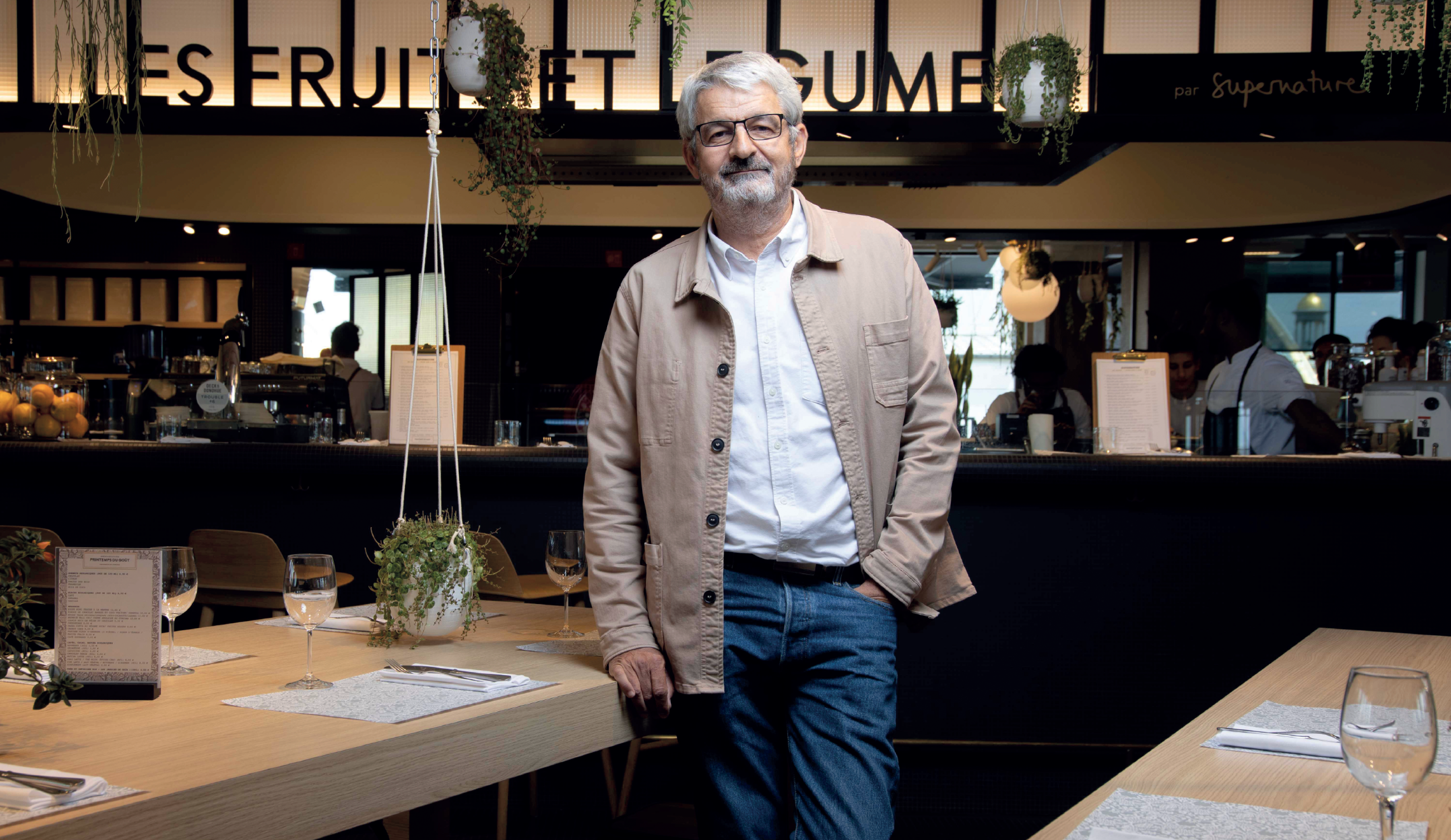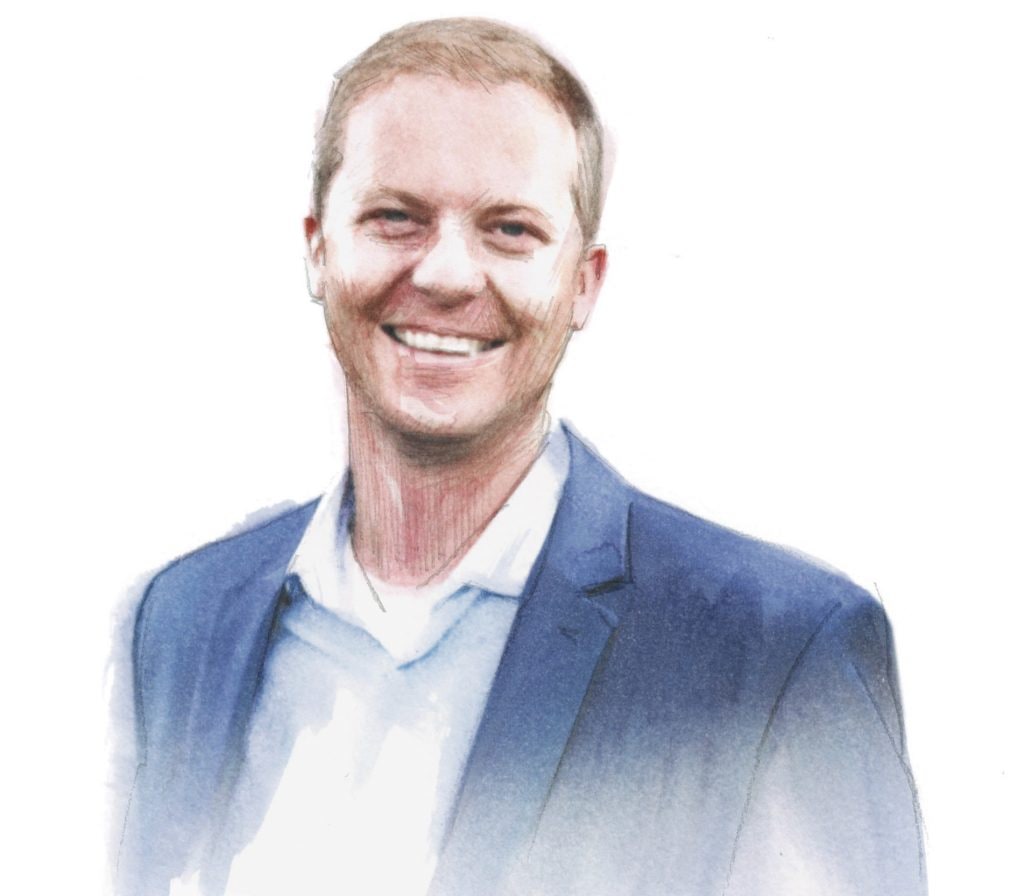
Though not exactly a reluctant foodservice consultant, Paul Montégut FCSI is keen to emphasise that he took his time finding his career path. He had grown up watching his father build his foodservice consultancy, Restauration Conseil, but never considered joining the family enterprise even though he had been asked to on several occasions.
Over coffee in one of his most recently completed projects – an entire floor of the famous Paris department store Printemps, dedicated to food – he talks of a career path that was entirely unplanned but ultimately satisfying.
“My father had the business since 1978 and I never wanted to join,” he says. Then one day, six months after his most recent invitation to join the family business, his father managed to persuade him. “He called and said he’d won a contract to work with Disneyland Paris and he had to travel to Los Angeles with his team – none of them spoke English so he asked me to come along to translate,” he recalls.
So in 1988 he went to Los Angeles as the translator and ended up staying with the company. “My father said: ‘OK, now you can stay and be our client contact’ because the client team were all American and I was still the only person who spoke English. I stayed and I found it was interesting,” he says.
Though foodservice had not crossed his mind as a career, he’d not considered too many other options. “I had no career aspirations. I had studied in commercial school and I spent two years doing my military service in Africa, but after that I spent two years with one company, three years with another. In the end I did find my way, thanks to Dad,” he says.
In hindsight it is perhaps no great mystery that he enjoyed the work. Over the course of a conversation, it becomes clear that Montégut thrives on contact with other people, collaborating and sharing experiences. “I honestly couldn’t work alone,” he says. “I like being with people, managing my team and managing clients. It is very nice to not be alone.”
At the start it was the communication with people that appealed, but before long he had to learn about the drawings – with time he came to enjoy designing and discussing the design element.
It turned out to be a great way to learn the ropes in a job that is hard to train for anyway. “If you want to become a kitchen designer, it will take you about 10 years,” he says. “It is not just one job, but multiple jobs – yes, it is all design, but designing a food court with several outlets and kitchens is nothing like designing a 7,000 sq m central production kitchen. The equipment is not the same and the processing is different. It takes 10 years to learn it all.”
Before joining his father, he had no foodservice experience, having never worked in design or operation. Disneyland Paris was his first project, a golden opportunity to learn by doing. “I was very happy to join the business, it was a big contract, in total we did four years of business with them, designing 44 kitchens in all,” he says. Restauration Conseil’s contract with Disneyland Paris remains the biggest contract ever to be awarded to a foodservice consultant in France.
For the business, it meant that a new team of 14 was established in addition to the existing team of seven who carried on with the regular contracts. Montégut took charge of the team working on the Disneyland project. “I enjoyed it a lot: it was new and I learnt a lot of new things, it was interesting.”
Learning every day
After 10 years, Montégut took charge of a business that had been uniquely shaped by his father. “My father invented the role of foodservice consultant in France,” he says. Montégut Senior had built the company after a career that started in foodservice operation and later moved to interior construction, a transition that brought him to the conclusion that many construction firms who worked in kitchens didn’t actually understand how a commercial kitchen needed to work.
For a long time after setting up the business there were just two or three consultants operating in the French foodservice sector. The timing was great. “My father was very well known in the business and he taught me everything – how to react in front of the client and how to listen. He always said: ‘You listen first and then you act’.”
The change in management brought a change in focus. While his father had taken on a lot of public sector contracts, Montégut says he doesn’t have the patience to go through the tender process. He considers working on a school kitchen as a copy and paste exercise. “The budget is low, the public sector has a lot of time for many meetings and with many people. It takes a long time and is not interesting to me,” he says.
Instead, he splits the company work between business and industry and hotels and restaurants. Employee restaurants make up a big part of the work and he has overseen foodservice projects in many of the office towers in La Défense business district of Paris, working with clients including IBM and BNP. “It is always about feeding employees, but each project is different,” he says. “In those big towers I work with brilliant architects and even though I know my job, I learn every day.”
At the start it was simple: there would be one restaurant for everybody that they’d moved around with a tray. As he is quick to point out, the French are different where lunch is concerned. “We eat at lunch so we have big kitchens where we prepare fresh food,” he says. “But we have to think of the demands of younger people; they want a sandwich or something quick if they want to go to the gym.”
Flexibility is key. “It is still quality food but quicker with salads, panini, new buffets with quicker food, but always high-quality fresh food,” he says. In the years since he has somewhat downsized. A serious health problem three years ago forced him out of business for almost six months as he recovered from heart surgery. It brought ample time for reflection – one outcome was the downsizing of Restauration Conseil.
“I have five people working with me now, I don’t take on more work than I can do. I’ve raised prices and I do quality work for fewer clients, but good clients, and that is how I work now,” he explains.
Bearing in mind his own journey to become a fully-fledged foodservice consultant – learning by doing – he values training above all when a new person joins the profession. Few people come to the business with knowledge of foodservice and design; they usually have to be trained in one of the areas. “Our job is very special, we are in buildings and it is very technical but we also have to think about how to cook food and what equipment to cook with and consider the menu. It is a schizophrenic job,” he says. “You can hire people who know the food business or the design business, but not both. You need to train them.”
But in a way, this is the easy part. His job, he says, starts once the training is complete: “Then you have to make sure they don’t leave,” he laughs. “You have to make the company attractive, make yourself attractive, offer a good salary and a nice office. It is so hard to find the people you need to do those things.”
His team have all been with the company for a long time, he trained them himself, he is happy with the team and wants them to be content. “I want them to come to the office with a smile on their face; if they don’t I have to ask them: ‘Why are you not smiling?’. If there is a problem with work I should have a solution, if it is at home I can’t do very much, but I can listen,” he says. “I don’t know if I am a good manager, but I have what I want. My team thinks for themselves; they are not robots. They discuss designs with me.”
He was not always that attuned to the wellbeing of his staff, but as he needs to stay healthy himself he wants them to be healthy too. “No stress. Every day at a certain time I say to them ‘go home’ and I didn’t do that before I got ill,” he says. “Since the health scare I had to think again how to handle myself and I have to handle other people the same way. I apply to others what I apply to myself; I want to be healthy. I want to be efficient but in fewer hours and I want to be calm and happy. I need my people to be healthy too.”
No parachute
The loss of space in kitchens is a challenge for designing and one that he thinks has potential to change things. The Printemps du Goût food court where we meet is a case in point. “It is a challenge because the operator wants the space for the public,” he says. “It was a constant fight; in each meeting I lost 10 centimetres.”
He doesn’t expect this particular challenge to go away. “We have to learn to reduce the size of kitchens, we have to think more about the process and the cooking method. We just have to deal with what the manufacturers propose; it is part of the job, I can’t do anything about it so I have to adapt,” he says.
But then, he says, the work of a foodservice consultant is about adapting. “We have to adapt to the need of the client who has a menu they want or a certain number of covers per day to a building. That building is designed by an architect whose needs we need to consider and of course we adapt to the equipment that is proposed by manufacturers,” he says. “All our work is about adapting.”
After 30 years in business there’s still more to learn. Four years ago Restauration Conseil started using BIM on projects – he says this has brought more new business. “Clients I have never worked with before now ring me because they know we can do work in BIM,” he says.
It was not a planned move, nor was it an easy journey to get here. He landed in a situation on a job where it was announced that BIM would be used. “I asked the client: ‘Why are you speaking to me in Chinese?’. I had not heard of it before, but everybody else was happy to do it in BIM, so I said OK we’ll do it in BIM,” he explains. “I agreed with my team that we’d learn it and that is how we started – a big jump with no parachute.”
He thinks for those who embrace the challenge, BIM is among the biggest potential growth areas for foodservice consultants. “It was very difficult but today we use BIM for 80% of our clients and because it takes a long time to arrive to this level in Revit, we are among the few who have achieved it and I have new clients because of this,” he says.
It may have been challenging but he says it is the future. “When you work on big things, doing it in 3D means you can see all the problems immediately. We can solve problems in the planning stage whereas before we solved them in the construction stage, which was really too late,” he says. “We have to remember the kitchen is not a stand-alone project, we are a part of the building and we have to be part of the design team.”
As he starts to contemplate the end of his career in foodservice – aged 62 he says he will perhaps work another three or four years – it seems fitting that among the final contracts is a return to Disneyland where he is managing some refurbishment and extension work. “In 30 years we have done nothing with them, but they have now returned and I have been working with them for the last two years,” he says. “I started my career with Disney and I will end with them too.”
What will happen with the business when he retires is not clear, but he is determined that he will not close before his team members has a new job – or the company is sold. The good thing is it shouldn’t be difficult – foodservice consultants in France are busy. “Everybody has lots of work,” says Montégut. “After 40 years in the business we are succeeding in saying to people that they should engage a foodservice consultant. That is good.”
Tina Nielsen




